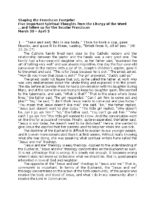Shaping the Franciscan Footprint
Five Important Spiritual Thoughts from the Liturgy of the Word
…and follow up for the Secular Franciscan
March 30 – April 5
1 — “Take and eat; this is my body.” Then he took a cup, gave thanks, and gave it to them, saying, “Drink from it, all of you.” (Mt 26:26-27)
The Catholic family lived next door to the Catholic rectory and the relationship between the pastor and the family was a very good one. The family had a four-year-old daughter who, as her father said, “mastered the art of talking very well” and was always inquisitive. One day the four-year-old came over to the rectory with a jar of St. Joseph’s children’s aspirin, gave it to the priest and said, “This is for Jesus because he is sick.” The priest asked, “How do you know that Jesus is sick?” The girl answered, “Daddy said so.”
The priest could not figure that out, so he called the father at work who was very embarrassed about the whole thing and explained it to the priest. The day before at Sunday Mass he had a conversation with his daughter during Mass, and at the same time was trying to keep his daughter quiet. She pointed to the tabernacle, and said, “What is that?” “That is the place where Jesus lives,” the father said. The girl responded: “Can I ask him to come out and play?” “No,” he said, “I don’t think Jesus wants to come out and play today.” “You mean that Jesus doesn’t like me?” she said. “No,” the father replied, “Jesus just doesn’t want to play today.” The little girl replied, “Why doesn’t he, can I go ask him?” “No,” the father said, “You can’t go ask him.” “Why can’t I go ask him” the little girl wanted to know. And the conversation went on like this for a couple of minutes. Finally, quite exasperated, the father said, “Jesus is sick today, he doesn’t want to be disturbed.” Hence, she wanted to give Jesus the aspirins that her parents used to help her when she was sick.
The doctrine of the Eucharist is difficult to explain to our younger people, and it is even more complicated than it at first seems. Without really knowing what she was doing, she was speaking what spiritual writers have called the “Jesus and me” theology.
“Jesus and me” theology is easy theology. Applied to the understanding of the Eucharist, “Jesus and me” theology concentrates on the Eucharist as such. It is not a theology that is wrong; it is simply not enough. It becomes wrong when it does not move us to become what we should be, that is, good people interested in love of God and neighbor.
The opposite of the “Jesus and me” theology is “Jesus and we.” That is, community is important. In terms of the Eucharist, the “Jesus and we” theology concentrates on the action of the faith community, of the people who receive the body and blood of Jesus, and what I do in my community after I receive the Lord in Communion.
In a “Jesus and we” theology, we can never receive the Real Presence of Jesus and at the same time hate anyone else or refuse to forgive another or ruin another’s reputation or deliberately be divisive in the church or community or family. The fact is, however, that many times people receive the body of Christ in Communion and do not let it affect the body of Christ next to them in the pew or in the neighborhood.
The little girl in the story did not know what the Eucharist was all about, but she knew that Jesus was a person and a friend. If Jesus becomes a person and a friend to us, we will not just “keep him” in the tabernacle of our Churches. We will make him active in our lives.
And maybe even ask him to come out and play with us.
[The Eucharist is central for the Franciscan. Do I go to Mass as often as I can?]
2 — But Jesus cried out again in a loud voice, and gave up his spirit. (Mt 27:50)
…The Lord has redeemed me; do I act like it?
3 – “Mary took a liter of costly perfumed oil…and anointed the feet of Jesus and dried them with her hair.” (Jn 12:3)
…A sincere act of love. Do I show the love I have on behalf of others?
4 — Jesus answered, “Will you lay down your life for me? Amen, amen, I say to you, the cock will not crow before you deny me three times.” (Jn 13:38)
…We should study the denial of Peter carefully. In what areas of my life has there been a denial of Jesus, and have I completely corrected them?
5 — “Amen, I say to you, one of you will betray me.”
Deeply distressed at this, they began to say to him one after another, “Surely it is not I, Lord?” (Jn 26:21-22)
…The reason why Judas betrayed Jesus was personal gain or selfishness. It is only fitting that Lent ends with this thought of selfishness. Am I?

